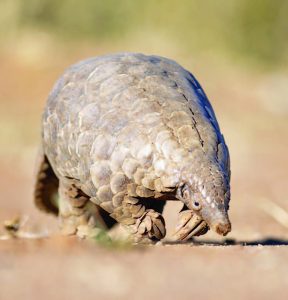When a marine biology student in Palawan saw what looked like an armadillo being mauled by stray dogs, she immediately came to its rescue—not that the scaly animal needed help.
Estrelieta Longakit, who was in the news this summer after having rescued the odd-looking animal, eventually handed it over to the Palawan Wildlife Rescue and Conservation Center. They realized that the creature she had rescued was the Palawan scaly anteater, also known as the Philippine pangolin.
Capable of protecting itself from other animals because of the tough, pointed scales that cover its body, the pangolin can easily survive an attack by dogs on the prowl for prey.
However, no amount of curling up into a tight, bite-proof ball can save the pangolin from one particularly cruel species: man.
SCALY ARMOR
The pangolin’s claim to fame lies in its scales: it is the only mammal in the world covered in them. FebruaryUnfortunately, it is these very scales that have helped put this fascinating animal on the endangered species list of the International Union for Conservation of Nature Red List of Threatened Species.
Also known as the balintong, the pangolin is being hunted and trafficked almost to the point of extinction, its scales and meat sold in the black market for alleged healing properties, which are all superstitious and unfounded.

NEARING EXTINCTION
A once-ubiquitous animal in Palawan, because its poaching remains mostly unchecked, its numbers are dwindling quickly. The Palawan Council for Sustainable Development (PCSD) proposed last year that the species be up-listed to Appendix I of the Convention on International Trade in Endangered Species of Wild Fauna and Flora (CITES). If listed as an Appendix-I species, the pangolin will be monitored for commercial trade in other countries and subjected to greater protection of the law, according to a 2016 PCSD article.
Countries in the CITES meeting in Africa gave an overwhelming vote to up-list all species of pangolins, including the Palawan-endemic balintong, and declared the trade of all pangolin meat and scales as illegal, according to BBC News.
Alvin Lao, who wrote about his encounter with the hardy but gentle pangolin in a previous issue, found the story behind the animal’s near-extinction rather unsettling. “The pangolin is now the most hunted and most trafficked wildlife in the world. This is because people in Asia believe that their meat improves vitality and their scales can cure several ailments.”
BALANCING THE SCALES
When it comes to surviving poaching and trafficking, the Philippine pangolin is at a disadvantage: It bears an average of one offspring when it breeds— and it does so only once a year, according to Animal Diversity Web of the University of Michigan.
Although the Wildlife Resources Conservation and Protection Act (Republic Act 9147) protects the endangered pangolin from extinction by prohibiting its sale or collection, its implementation proves tricky. The pangolin simply isn’t as famous as other animals nearing extinction, which means not a lot of people are aware that its very existence is at risk. Smuggling its scales and meat is also easy; no wonder it’s the most illegally-trafficked mammal in the world.
“This is very perplexing for me,” Lao wrote. “I grew up seeing and knowing that there were a lot of pangolins. I realized all of a sudden that there are not any more of them.”
Read more about the pangolin here: https://animalscene.mb.com.ph/2018/05/02/the-palawan-pangolin/
This appeared in Animal Scene magazine’s October 2017 issue.






